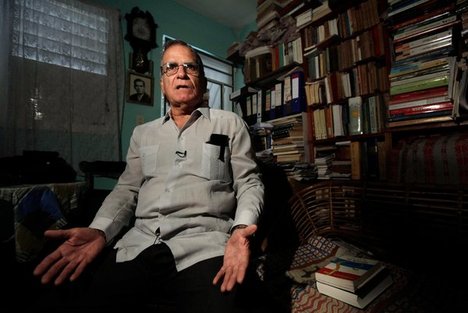 “Oscar Espinosa Chepe in 2010.” Source of caption and photo: online version of the NYT obituary quoted and cited below.
“Oscar Espinosa Chepe in 2010.” Source of caption and photo: online version of the NYT obituary quoted and cited below.
(p. B15) Oscar Espinosa Chepe, a high-ranking Cuban economist and diplomat who became a vocal critic of Fidel Castro in the 1990s but chose to remain in Cuba, despite enduring harassment and imprisonment, died on Monday [September 23, 2013] . . .
. . .
Mr. Espinosa Chepe (pronounced CHEH-pay) lost his job as an official of the National Bank of Cuba in 1996 after advocating the limited restoration of capitalist principles like the right to buy and sell one’s home or start a business.
He then became a journalist, writing articles for American and Spanish-language Web sites in which he used statistical data to analyze Cuba’s economic problems. In March 2003 he was one of 75 activists arrested as part of a government crackdown on dissent known as the Black Spring.
. . .
Mr. Espinosa Chepe, who joined Castro’s revolutionary government in the early 1960s and was once head of the powerful Office of Agrarian Reform, had frequently clashed with fellow economic planners over policies he considered overly dogmatic.
His internal critique became increasingly adamant after 1991, when the loss of the Soviet Union’s financial support began taking a devastating toll on the country’s economy. But his proposals for change, many of which had already been adopted in former Soviet bloc states, were labeled counterrevolutionary, said Carmelo Mesa-Lago, a professor emeritus of economics and Latin American studies at the University of Pittsburgh and an expert on Cuban economic policies.
For the full obituary, see:
PAUL VITELLO. “Oscar Espinosa Chepe, Cuban Economist and Castro Critic, Dies at 72.” The New York Times (Fri., September 27, 2013): B15.
(Note: ellipses, and bracketed date, added.)
(Note: the online version of the obituary has the date September 25, 2013.)
